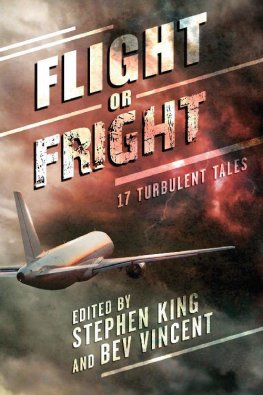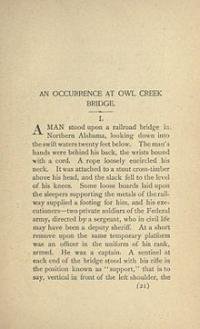Ambroz Birs - The Death of Halpin Frayser
Here you can read online Ambroz Birs - The Death of Halpin Frayser full text of the book (entire story) in english for free. Download pdf and epub, get meaning, cover and reviews about this ebook. genre: Prose. Description of the work, (preface) as well as reviews are available. Best literature library LitArk.com created for fans of good reading and offers a wide selection of genres:
Romance novel
Science fiction
Adventure
Detective
Science
History
Home and family
Prose
Art
Politics
Computer
Non-fiction
Religion
Business
Children
Humor
Choose a favorite category and find really read worthwhile books. Enjoy immersion in the world of imagination, feel the emotions of the characters or learn something new for yourself, make an fascinating discovery.

- Book:The Death of Halpin Frayser
- Author:
- Genre:
- Rating:4 / 5
- Favourites:Add to favourites
- Your mark:
- 80
- 1
- 2
- 3
- 4
- 5
The Death of Halpin Frayser: summary, description and annotation
We offer to read an annotation, description, summary or preface (depends on what the author of the book "The Death of Halpin Frayser" wrote himself). If you haven't found the necessary information about the book — write in the comments, we will try to find it.
The Death of Halpin Frayser — read online for free the complete book (whole text) full work
Below is the text of the book, divided by pages. System saving the place of the last page read, allows you to conveniently read the book "The Death of Halpin Frayser" online for free, without having to search again every time where you left off. Put a bookmark, and you can go to the page where you finished reading at any time.
Font size:
Interval:
Bookmark:
The Death of Halpin Frayser
by Ambrose Bierce
I
For by death is wrought greater change than hath been shown. Whereas in general the spirit that removed cometh back upon occasion, and is sometimes seen of those in flesh (appearing in the form of the body it bore) yet it hath happened that the veritable body without the spirit hath walked. And it is attested of those encountering who have lived to speak thereon that a lich so raised up hath no natural affection, nor remembrance thereof, but only hate. Also, it is known that some spirits which in life were benign become by death evil altogether.
Hali.ONE dark night in midsummer a man waking from a dreamless sleep in a forest lifted his head from the earth, and staring a few moments into the blackness, said: "Catherine Larue." He said nothing more; no reason was known to him why he should have said so much.
The man was Halpin Frayser. He lived in St. Helena, but where he lives now is uncertain, for he is dead. One who practices sleeping in the woods with nothing under him but the dry leaves and the damp earth, and nothing over him but the branches from which the leaves have fallen and the sky from which the earth has fallen, cannot hope for great longevity, and Frayser had already attained the age of thirty-two. There are persons in this world, millions of persons, and far and away the best persons, who regard that as a very advanced age. They are the children. To those who view the voyage of life from the port of departure the bark that has accomplished any considerable distance appears already in close approach to the farther shore. However, it is not certain that Halpin Frayser came to his death by exposure.
He had been all day in the hills west of the Napa Valley, looking for doves and such small game as was in season. Late in the afternoon it had come on to be cloudy, and he had lost his bearings; and although he had only to go always downhilleverywhere the way to safety when one is lostthe absence of trails had so impeded him that he was overtaken by night while still in the forest. Unable in the darkness to penetrate the thickets of manzanita and other undergrowth, utterly bewildered and overcome with fatigue, he had lain down near the root of a large madroo and fallen into a dreamless sleep. It was hours later, in the very middle of the night, that one of God's mysterious messengers, gliding ahead of the incalculable host of his companions sweeping westward with the dawn line, pronounced the awakening word in the ear of the sleeper, who sat upright and spoke, he knew not why, a name, he knew not whose.
Halpin Frayser was not much of a philosopher, nor a scientist. The circumstance that, waking from a deep sleep at night in the midst of a forest, he had spoken aloud a name that he had not in memory and hardly had in mind did not arouse an enlightened curiosity to investigate the phenomenon. He thought it odd, and with a little perfunctory shiver, as if in deference to a seasonal presumption that the night was chill, he lay down again and went to sleep. But his sleep was no longer dreamless.
He thought he was walking along a dusty road that showed white in the gathering darkness of a summer night. Whence and whither it led, and why he traveled it, he did not know, though all seemed simple and natural, as is the way in dreams; for in the Land Beyond the Bed surprises cease from troubling and the judgment is at rest. Soon he came to a parting of the ways; leading from the highway was a road less traveled, having the appearance, indeed, of having been long abandoned, because, he thought, it led to something evil; yet he turned into it without hesitation, impelled by some imperious necessity.
As he pressed forward he became conscious that his way was haunted by invisible existences whom he could not definitely figure to his mind. From among the trees on either side he caught broken and incoherent whispers in a strange tongue which yet he partly understood. They seemed to him fragmentary utterances of a monstrous conspiracy against his body and soul.
It was now long after nightfall, yet the interminable forest through which he journeyed was lit with a wan glimmer having no point of diffusion, for in its mysterious lumination nothing cast a shadow. A shallow pool in the guttered depression of an old wheel rut, as from a recent rain, met his eye with a crimson gleam. He stooped and plunged his hand into it. It stained his fingers; it was blood! Blood, he then observed, was about him everywhere. The weeds growing rankly by the roadside showed it in blots and splashes on their big, broad leaves. Patches of dry dust between the wheelways were pitted and spattered as with a red rain. Defiling the trunks of the trees were broad maculations of crimson, and blood dripped like dew from their foliage.
All this he observed with a terror which seemed not incompatible with the fulfillment of a natural expectation. It seemed to him that it was all in expiation of some crime which, though conscious of his guilt, he could not rightly remember. To the menaces and mysteries of his surroundings the consciousness was an added horror. Vainly he sought by tracing life backward in memory, to reproduce the moment of his sin; scenes and incidents came crowding tumultuously into his mind, one picture effacing another, or commingling with it in confusion and obscurity, but nowhere could he catch a glimpse of what he sought. The failure augmented his terror; he felt as one who has murdered in the dark, not knowing whom nor why. So frightful was the situationthe mysterious light burned with so silent and awful a menace; the noxious plants, the trees that by common consent are invested with a melancholy or baleful character, so openly in his sight conspired against his peace; from overhead and all about came so audible and startling whispers and the sighs of creatures so obviously not of earththat he could endure it no longer, and with a great effort to break some malign spell that bound his faculties to silence and inaction, he shouted with the full strength of his lungs! His voice broken, it seemed, into an infinite multitude of unfamiliar sounds, went babbling and stammering away into the distant reaches of the forest, died into silence, and all was as before. But he had made a beginning at resistance and was encouraged. He said:
"I will not submit unheard. There may be powers that are not malignant traveling this accursed road. I shall leave them a record and an appeal. I shall relate my wrongs, the persecutions that I endureI, a helpless mortal, a penitent, an unoffending poet!" Halpin Frayser was a poet only as he was a penitent: in his dream.
Taking from his clothing a small red-leather pocketbook, one-half of which was leaved for memoranda, he discovered that he was without a pencil. He broke a twig from a bush, dipped it into a pool of blood and wrote rapidly. He had hardly touched the paper with the point of his twig when a low, wild peal of laughter broke out at a measureless distance away, and growing ever louder, seemed approaching ever nearer; a soulless, heartless, and unjoyous laugh, like that of the loon, solitary by the lakeside at midnight; a laugh which culminated in an unearthly shout close at hand, then died away by slow gradations, as if the accursed being that uttered it had withdrawn over the verge of the world whence it had come. But the man felt that this was not sothat it was near by and had not moved.
A strange sensation began slowly to take possession of his body and his mind. He could not have said which, if any, of his senses was affected; he felt it rather as a consciousnessa mysterious mental assurance of some overpowering presence some supernatural malevolence different in kind from the invisible existences that swarmed about him, and superior to them in power. He knew that it had uttered that hideous laugh. And now it seemed to be approaching him; from what direction he did not knowdared not conjecture. All his former fears were forgotten or merged in the gigantic terror that now held him in thrall. Apart from that, he had but one thought: to complete his written appeal to the benign powers who, traversing the haunted wood, might some time rescue him if he should be denied the blessing of annihilation. He wrote with terrible rapidity, the twig in his fingers rilling blood without renewal; but in the middle of a sentence his hands denied their service to his will, his arms fell to his sides, the book to the earth; and powerless to move or cry out, he found himself staring into the sharply drawn face and blank, dead eyes of his own mother, standing white and silent in the garments of the grave!
Font size:
Interval:
Bookmark:
Similar books «The Death of Halpin Frayser»
Look at similar books to The Death of Halpin Frayser. We have selected literature similar in name and meaning in the hope of providing readers with more options to find new, interesting, not yet read works.
Discussion, reviews of the book The Death of Halpin Frayser and just readers' own opinions. Leave your comments, write what you think about the work, its meaning or the main characters. Specify what exactly you liked and what you didn't like, and why you think so.


